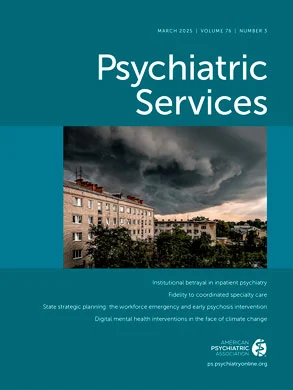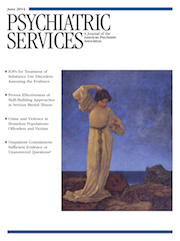Mental health systems are often challenged to find creative ways to meet demands for services while addressing issues of improving and assessing quality. After a major shift in which the Maryland Public Mental Health System reorganized the way it financed services from grants to a Medicaid-based fee-for-service system, the director of the Maryland Mental Hygiene Administration (MHA), the state mental health authority, decided to directly address the issue of quality by expanding a long-standing public-academic partnership with the Division of Psychiatric Services Research, Department of Psychiatry, University of Maryland School of Medicine.
Building on an existing collaboration that was formerly focused on training, MHA sought to both improve and evaluate the quality of services delivered by the public mental health system through two new avenues: implementing evidence-based practices and creating a more systematic and structured approach to the collection, analysis, and use of data. Using Mental Health Block Grant funds, MHA added two new centers—the Evidence-Based Practice Center (EBPC) and the Systems Evaluation Center (SEC)—to the existing Training Center to form the Behavioral Health Systems Improvement Collaborative. The BHSI Collaborative serves to keep administrators aware of current trends in mental health services, helps providers maintain current skills while learning new evidence-based and empirically supported approaches, and evaluates the effectiveness of the system as a whole, providing direction for policy development and future initiatives.
In this column, we describe how this public-academic partnership has worked to implement evidence-based and emerging practices and to evaluate the system.
Implementing evidence-based practices
The Training Center assists MHA in promoting current trends in behavioral health service delivery via conferences, training events, webinars, and so forth. The annual MHA conference (with more than 500 participants) updates attendees on important mental health system changes and promotes philosophical, policy, and practice shifts reflecting the current goals and initiatives of MHA. Examples include presentations on recovery, the role of employment in recovery, and the importance of person-centered planning in developing a recovery-oriented system. As MHA has moved the system toward evidence-based practices, the annual conference has provided the ideal forum to introduce these planned changes to the broad stakeholder population. In addition, as Maryland prepares to integrate the Mental Hygiene and Alcohol and Drug Abuse Administrations, this conference will provide information to prepare stakeholders for imminent system and funding changes arising from this integration.
The creation of the EBPC provided the capacity to increase access to evidence-based practices. In 2002, the EBPC began its participation in the National Evidence-Based Practices Demonstration Project with the implementation of supported employment and family psychoeducation (
1,
2). Implementation of supported employment reflected a major policy change by MHA in which competitive employment was fully endorsed and agency-sponsored employment was no longer reimbursable. As of October 2013, nearly three-quarters (71%) of vocational programs had received training and consultation. The change has resulted in significant improvement in employment outcomes, with over half of consumers in these programs engaged in competitive employment (nationally, vocational programs that do not use this evidence-based approach typically see outcomes in the 20% range).
During implementation of supported employment, significant multisystemic policy, practice, and financing barriers were encountered. Close collaboration among the EBPC, MHA, and the Division of Rehabilitation Services (the state vocational rehabilitation [VR] authority) resulted in successful resolution through multiagency service integration; policy alignment; and the leveraging and braiding of Medicaid funding, state general funds, and VR funds at the system level. MHA’s supported employment efforts have earned national recognition, including publication of a policy brief in “Promising Practices” on the Centers for Medicare and Medicaid Services Web site and MHA’s receipt of a Science to Service award from the Substance Abuse and Mental Health Services Administration (SAMHSA).
In 2003, the EBPC and the SEC collaborated with MHA to write a successful application for a SAMHSA-funded Evidence-Based Practice Implementation Grant. The EBPC began implementing assertive community treatment, with evaluation conducted by the SEC. Consumers’ access to this service has increased from one team in 2003 to 17 teams currently meeting fidelity criteria and serving more than 1,600 consumers.
As implementation of evidence-based practices progressed, providers continued to cite insufficient funding as a major impediment to achieving full-fidelity implementation. Therefore, MHA made a policy decision in 2006 to provide an incentive for adoption of evidence-based practices, with a higher reimbursement rate for programs meeting a fidelity threshold (established through collaboration with national fidelity measurement experts). This action is seen as essential to the successful implementation of these practices in Maryland and emphasizes the critical importance of close collaboration between implementation efforts and state support (
3).
Implementing emerging practices
Recognizing the importance of emerging and promising practices that are not yet recognized as evidence-based practices but that have some empirical support, MHA has funded the EBPC to address co-occurring mental and substance use disorders and behavioral health issues of transition-age youths. In support of MHA’s goal of improving treatment for individuals with co-occurring disorders, the EBPC is working to enhance system, program, and provider capability. After MHA’s 2006 policy decision requiring screening for and assessment of substance use disorders for all consumers, the EBPC provides regional training for mental health and substance abuse treatment clinicians. Additional efforts include consultation to counties and jurisdictions to support better integration of services to this population, training and consultation for agencies committed to developing or enhancing services for individuals with co-occurring disorders, and provision of training to assertive community treatment teams and substance abuse specialists. To address issues encountered by youths in transition, the EBPC is training state-funded programs in order to implement evidence-supported practices for this population.
To operationalize its emphasis on person-centered care, MHA has funded training from a national expert on person-centered planning. Thus all EBPC activities reflect the philosophy of person-centered care, helping promote MHA’s goal of a strengths-based, recovery-oriented behavioral health system.
Evaluating the system
The SEC was designed to address MHA’s goals of becoming more data driven and responsive to growing demands for system accountability. Although the state had conducted quality reviews and monitored some data elements, no methodical evaluation of system activities existed. Creation of the SEC not only capitalized on the university’s expertise in research and data analysis but formed a tangible link between the service-oriented mental health system and the university’s research-oriented academic environment. This link has provided ongoing opportunities for the SEC to scientifically address policy issues most relevant to the public behavioral health system.
The SEC’s initial work focused on legislative questions regarding care coordination and system management. The SEC conducted a study examining the coordination between hospitals and community services and supports. A second study examined the role and impact of the Core Service Agencies (local mental health authorities) in Maryland. The legislature then used the study results to inform decision making.
Although these studies addressed specific legislative questions, the need for ongoing, systemwide evaluation remained. This led MHA and the SEC to develop the Outcomes Measurement System (OMS) to provide data for system planning and management. The SEC facilitated the development of the OMS, which tracks how individuals receiving outpatient mental health treatment services are doing over time by collecting data about recovery and resilience, psychiatric symptomatology, substance use, health, and other areas. A public online reporting system was created that presents state and county data; mental health service providers are also able to access their agency’s data.
OMS data elements support policy change and development at several levels. They help Maryland fulfill federal reporting requirements and are included in both the state mental health budget document and the Maryland StateStat strategies. StateStat is used by state managers, the governor, and his executive staff to monitor priority initiatives and develop improvement strategies. At the local level, OMS data are a required element of the Core Service Agency plans. The data serve as a tool for mental health service providers to inform program development and improvement. Current SEC activities include the development of training materials related to the interpretation and use of OMS data; implementation of “Data Forums” related to the OMS and other system data; and, in collaboration with MHA, production of “Data Shorts,” which are brief reports providing behavioral health data in a user-friendly way. All of these activities are designed to help ensure that OMS data and other administrative data are used for continuous quality improvement at a variety of system levels.
SEC data analysis and evaluation activities for MHA extend well beyond the OMS. This public-academic collaboration has increased the state’s capacity to use authorization and claims data for various system management functions. The state has used SEC-generated analyses to set reimbursement rates, evaluate state plan goals and objectives, determine compliance audit sample sizes, assist in the development of an “institution for mental diseases” waiver demonstration application, and help inform the integration of the state mental health and substance abuse administrations. With permission from MHA, the SEC also performs data analyses for researchers interested in using system data for grant applications, program evaluations, and research studies. The SEC has also served as the evaluation team for federally funded grants received by MHA, such as the aforementioned SAMHSA-funded Evidence-Based Practice Implementation Grant and, more recently, Maryland’s Mental Health Transformation State Incentive Grant.
Conclusions
Through this public-academic collaboration, MHA is enacting its commitment to improve access to high-quality behavioral health services for Maryland citizens. The collaboration is a natural fit, with the university’s mission complementing the state’s goals. This mutually beneficial arrangement has enabled the state and the university to have a greater impact working together than they could have working separately and has resulted in increased access to evidence-based practices, ongoing system evaluation, integration of data analysis into management decisions, and training mechanisms to ensure that services are consistent with MHA’s vision and philosophy. Critical to the success of the collaboration has been the very close working relationship between both entities, including frequent and open communication. The bidirectional nature of this partnership fosters a data-driven approach to policy making and creates mechanisms for promoting and enacting such policies.
Acknowledgments and disclosures
The authors report no competing interests.

